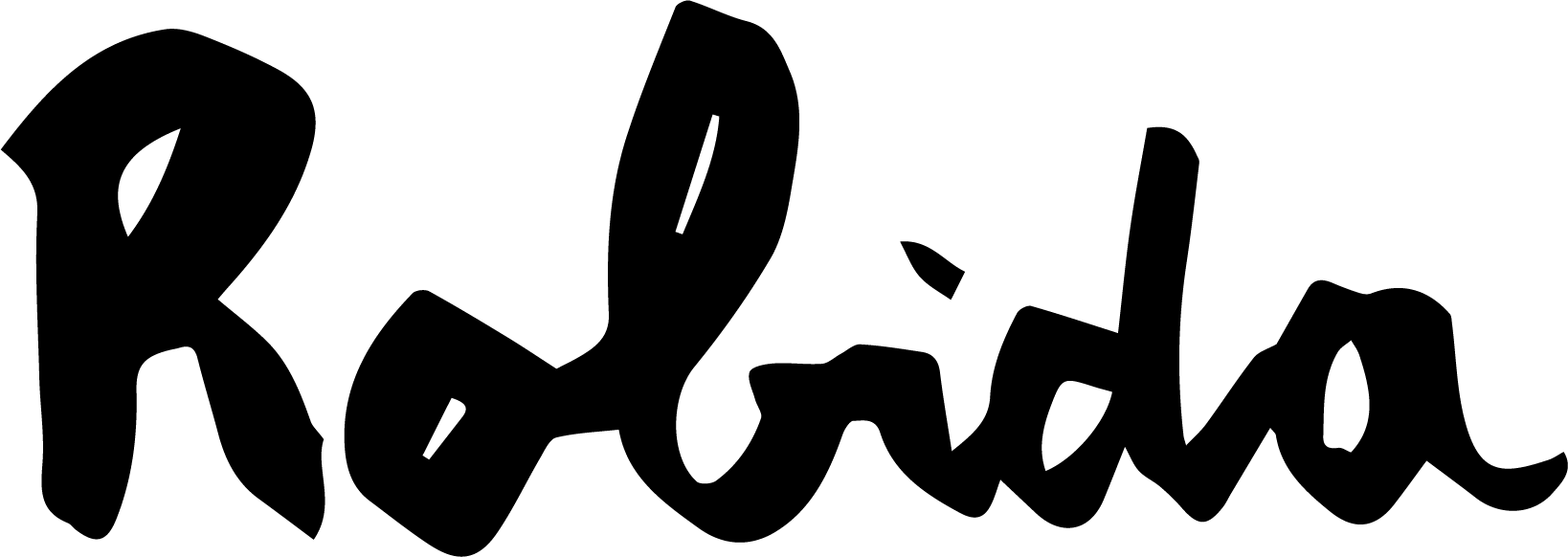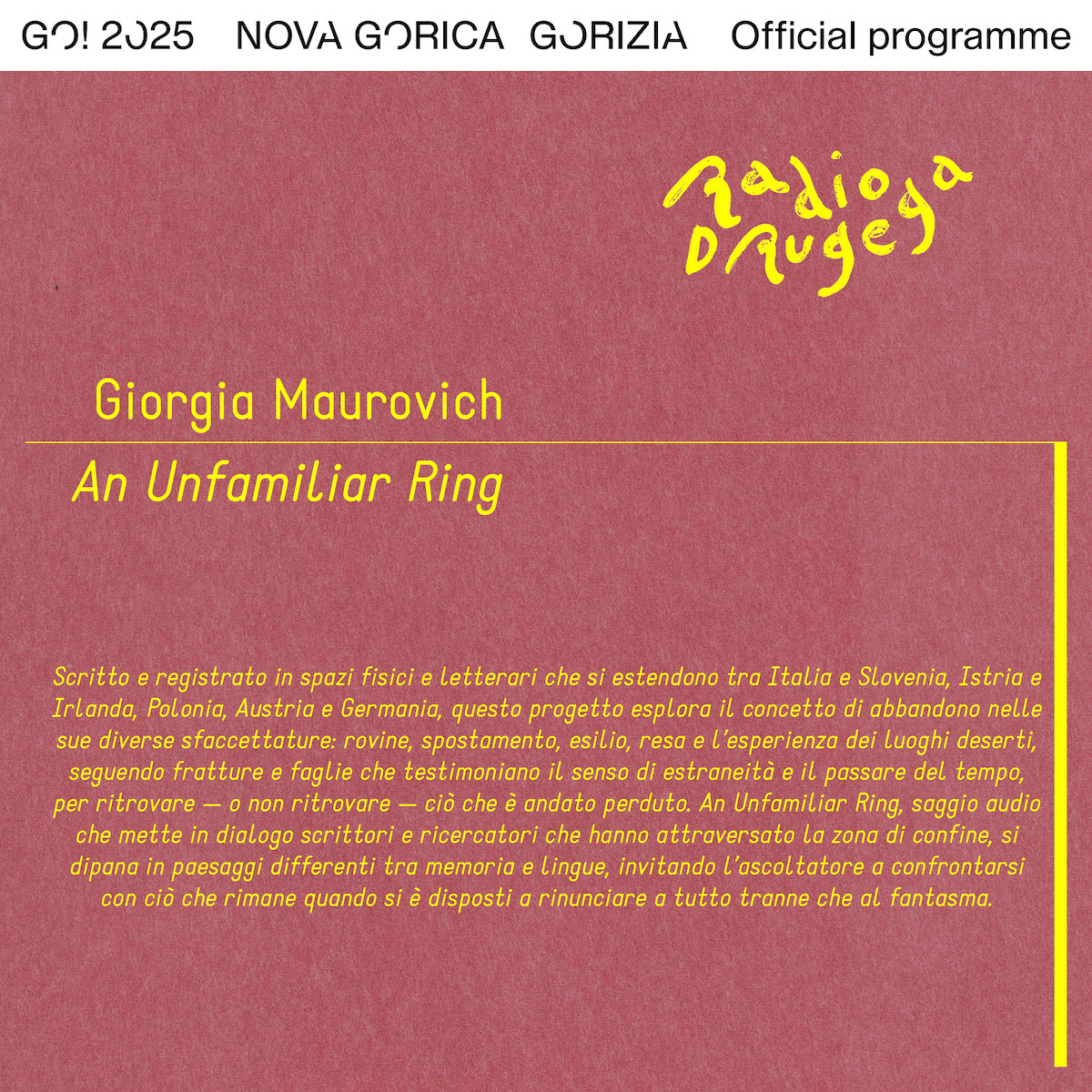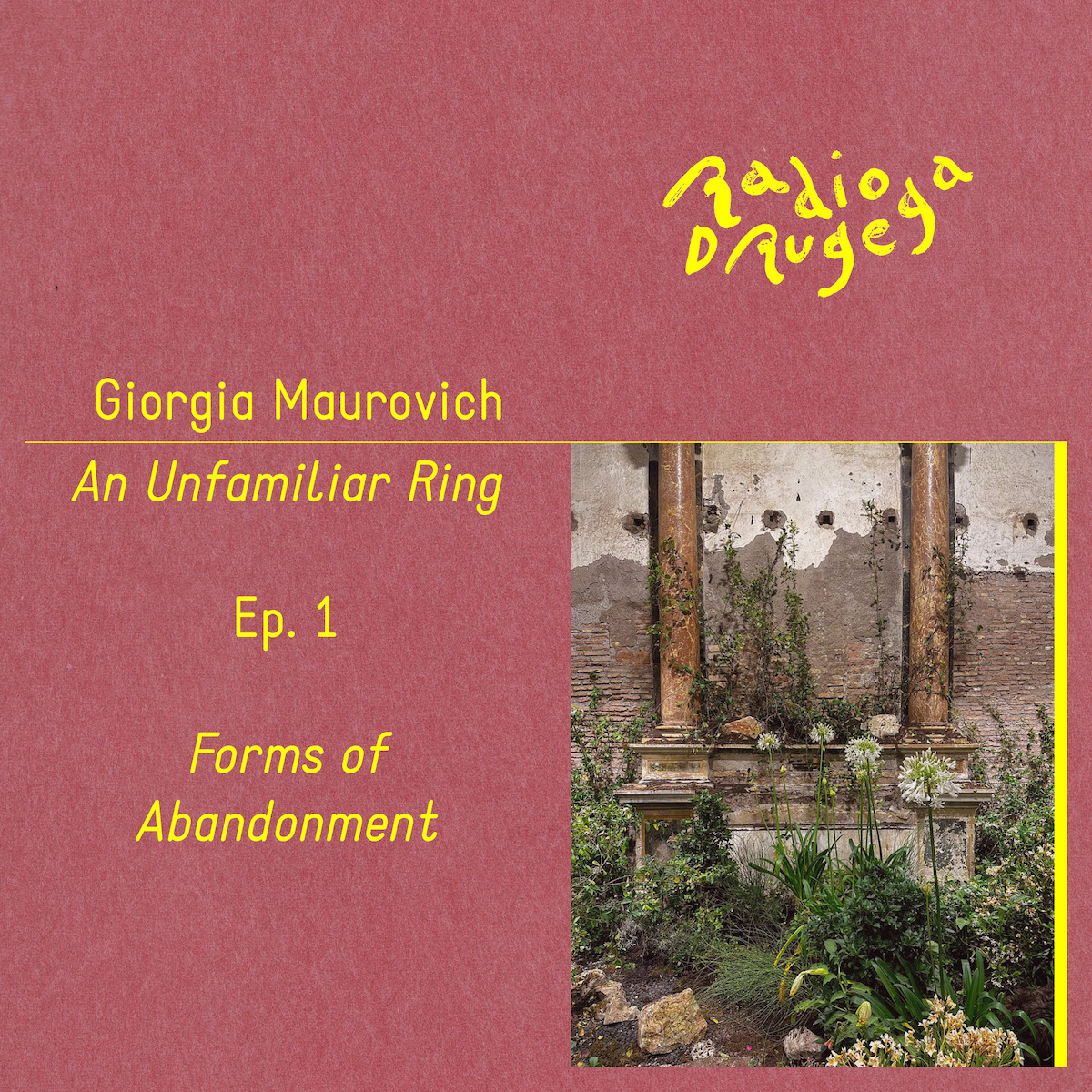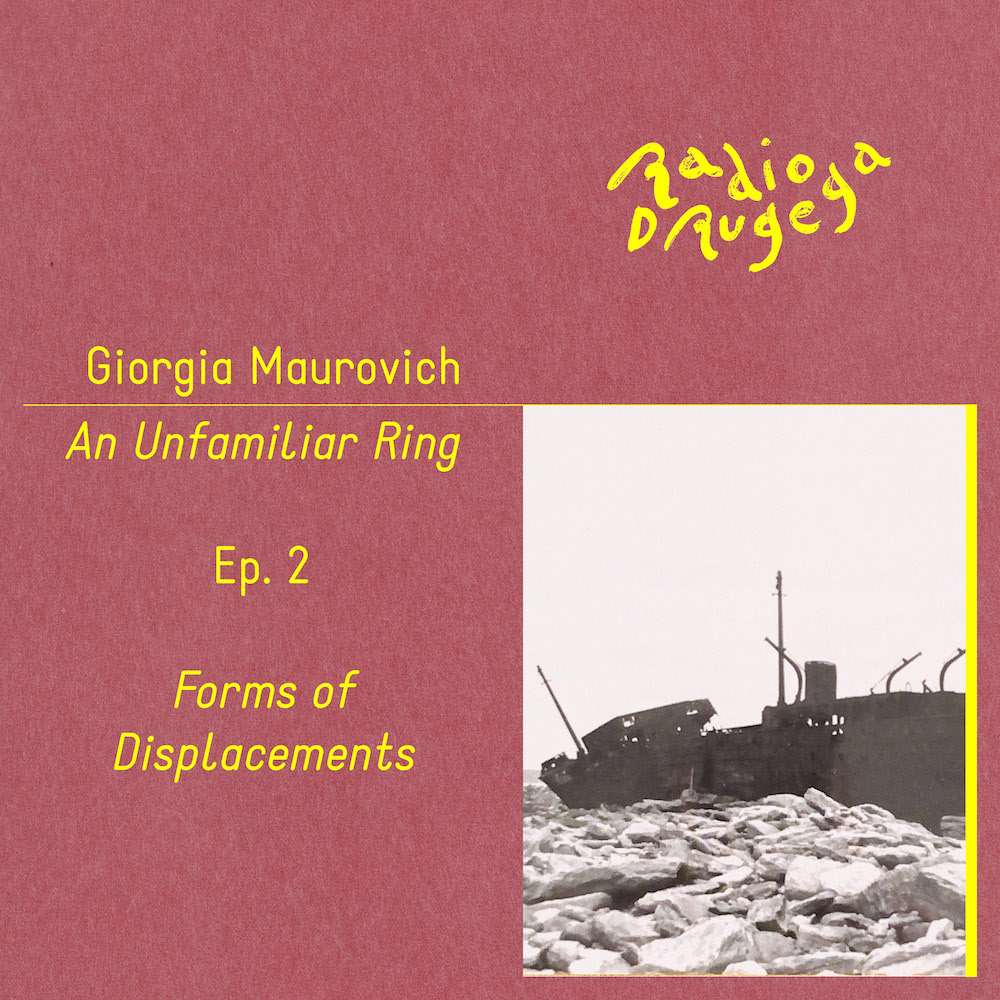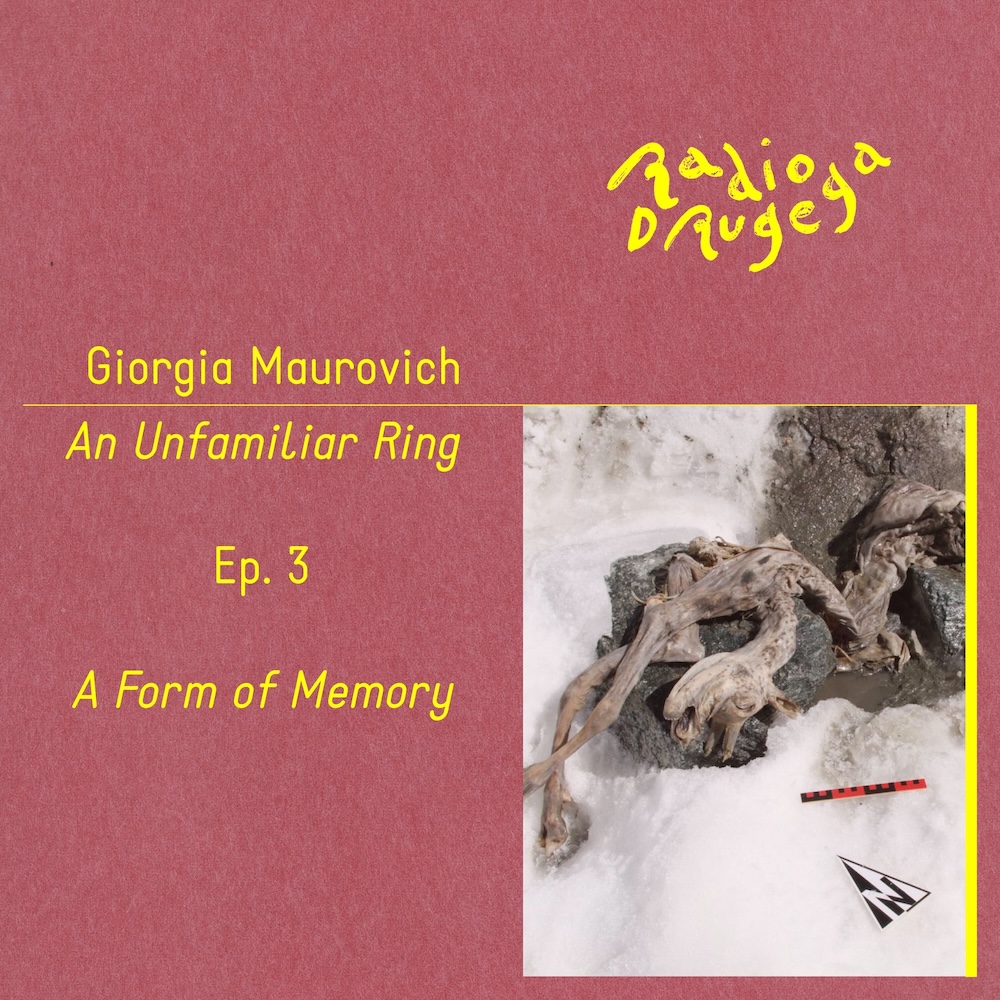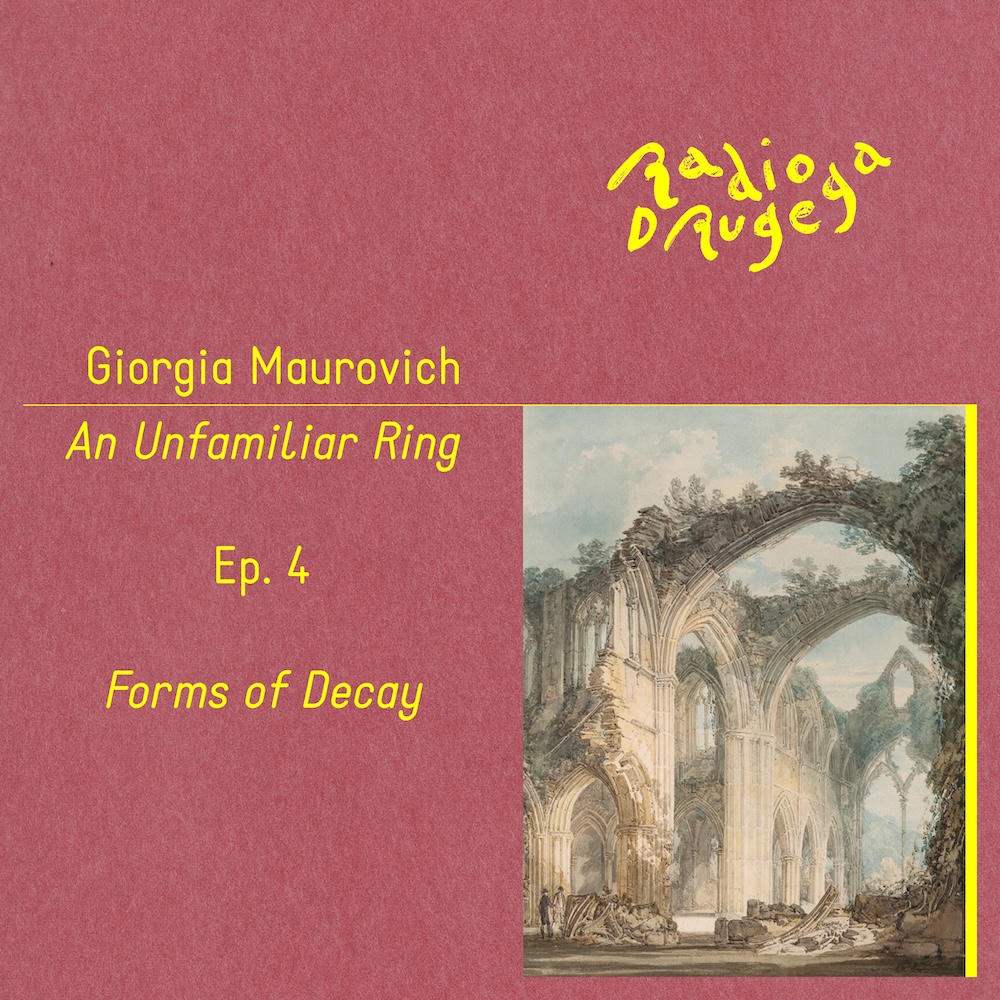Scritto e registrato in spazi fisici e letterari che si estendono tra Italia e Slovenia, Istria e Irlanda, Polonia, Austria e Germania, questo progetto esplora il concetto di abbandono nelle sue diverse sfaccettature: rovine, spostamento, esilio, resa e l'esperienza dei luoghi deserti, seguendo fratture e faglie che testimoniano il senso di estraneità e il passare del tempo, per ritrovare - o non ritrovare - ciò che è andato perduto. An Unfamiliar Ring, saggio audio che mette in dialogo scrittori e ricercatori che hanno attraversato la zona di confine, si dipana in paesaggi differenti tra memoria e lingue, invitando l'ascoltatore a confrontarsi con ciò che rimane quando si è disposti a rinunciare a tutto tranne che al fantasma.
Il progetto The Other Radio fa parte del programma ufficiale della Capitale Europea della Cultura 2025 Nova Gorica - Gorizia.
〰️
Written and recorded in physical and literary spaces stretching between Italy and Slovenia, Istria and Ireland, Poland, Austria, and Germany, this project explores the concept of abandonment in its various facets: ruins, displacement, exile, surrender, and the experience of deserted places, tailing the fractures and faults that witness the feeling of foreignness and the passing of time, to retrieve or unretrieve what’s lost. An audio essay that connects writers and researchers who have crossed the border area, An Unfamiliar Ring unravels in different landscapes between memory and languages, inducing the listener to face what’s left when willing to give up anything but the ghost.
The Other Radio project is part of the official programme of the European Capital of Culture 2025 Nova Gorica - Gorizia.
〰️
Ep. 1 Forms of Abandonment
The first episode of this series aims to describe the problem of the formal representation concept of abandonment. Starting from literary descriptions of natural disasters and abandoned landscapes, the questions raised range from the individual's experience of destruction to the survival strategies that the natural environment enacts after a moment of rupture, tracing the limits and the complex emotional trajectories of individuals' interdependence on the homeostatic processes of states of abandonment.
Voices: Giorgia Maurovich, Alexei Monroe, Dušan Šarotar
Field recordings: Alexei Monroe, Aljaž Škrlep
Editing: Aljaž Škrlep
Bibliografija:
- Marc Augé, Rovine e macerie. Il senso del tempo
- Walter Benjamin, Tesi sulla filosofia della storia
- Maurice Blanchot, Lo spazio letterario
- Brian Dillon, Ruins
- Daša Drndić, Belladonna
- Gay Hawkins: History in Things – Sebald and Benjamin on Transience and Detritus, in Gerhard Fischer (ed.), W. G. Sebald. Schreiben Ex Patria / Expatriate Writing
- Cal Flynn, Islands of Abandonment
- Max Frisch, Der Mensch erscheint im Holozän
- Nicola Gardini, Lacuna. Saggio sul non detto
- Claude Lévi-Strauss, Tristi tropici
- Richard Longstreth (ed.), Cultural Landscapes
- Bernie Krause, The Great Animal Orchestra
- Daniel Mendelsohn, Three Rings: A Tale of Exile, Narrative, and Fate
- Alexei Monroe, The Path to Abandonment
- Carl Sauer, The Morphology of Landscape
- W. G. Sebald, Gli anelli di Saturno
- Marija Stepanova, Memoria della memoria
- Dušan Šarotar, Panorama
- Dušan Šarotar, Nikomah poroča
Ep. 2 Forms of Displacement
The highlight of this episode is a second form of abandonment, which will be referred to as displacement. In the continuity of the suggestions of a precise, recurring image within public memory and the arts, that of a marine carcass offered to the public gaze, and of the literary representation of a city of outcasts and émigrés such as Berlin, the analysis centers the possibilities that physical, linguistic, and conceptual displacement opens up in perception, addressing the question of exile from a formal, sensory, and iconographic point of view.
Voices: Giorgia Maurovich, Alexei Monroe, Dušan Šarotar
Field recordings: Alexei Monroe, Aljaž Škrlep
Editing: Aljaž Škrlep
Bibliografija:
- Ingeborg Bachmann, Witold Gombrowicz
- Vlad Beronja, Shards of broken glass: Daša Drndić’s archival poetics, in FLUMINENSIA, god. 32 (2020), no. 1, p. 11-38
- Iosif Brodskij, Dall’esilio
- Iosif Brodskij, Fuga da Bisanzio
- Cynthia Cruz, Disquieting: Essays on Silence
- Caitlin DeSilvey, Curated Decay: Heritage beyond Saving
- Daša Drndić, April u Berlinu
- Mark Fisher, The Weird and the Eerie
- Nicola Gardini, Lacuna
- Danilo Kiš, Homo Poeticus
- László Krasznahorkai, Melancolia della resistenza
- Alexei Monroe, The Path to Abandonment
- Vladimir Nabokov, A Guide to Berlin
- Vladimir Nabokov, Pnin
- Elena Pirazzoli, Intervista a Christian Boltanski, Il Mulino (URL: www.rivistailmulino.it/a/intervista-…ian-boltanski, consultato 15.03.2025)
- Dylan Trigg, Memory of Place: A. Phenomenology of the Uncanny
- Dylan Trigg, Topophobia: A Phenomenology of Anxiety
- Dušan Šarotar, Nikomah poroča
- Dušan Šarotar, Panorama
- Dara Šljukić, The Politics of (Non)Belonging in Three Novels by Daša Drndić
- Viktor Šklovskij, Zoo o lettere non d’amore
- Dubravka Ugrešić, Il museo della resa incondizionata
Ep. 3 Forms of Memory
The third episode revolves around the concept of memory, stretching between the theoretical modes of its representation and the concrete existence of history in monuments and landscapes marked by trauma. Starting from the poetics of the fragment outlined in the previous episode, this third part investigates the iterations of trauma and memory in art, on the territory, and in conservation practices, discussing the various ways in which individual history intertwines with that of the landscape and influences it. Among photographs, artifacts, abandoned houses, and ruined landscapes, what emerges is the persistence of a wound that memory seeks to answer.
Bibliography:
- Aristotele, De Memoria
- Giorgio Agamben, Homo Sacer
- Marc Augé, Rovine e macerie. Il senso del tempo
- Gaston Bachelard, La poetica dello spazio
- Daša Drndić, Belladonna
- Mark Fisher, The Weird and the Eerie
- Cal Flyn, Isole dell’abbandono
- Nicola Gardini, Lacuna. Saggio sul non detto
- Gay Hawkins, History in Things – Sebald and Benjamin on Transience and Detritus, in Gerhard Fischer (ed.), W. G. Sebald. Schreiben Ex Patria / Expatriate Writing
- Osip Mandel’štam, Il rumore del tempo
- Simon McBurney, Mnemonic
- Alexei Monroe, The Path to Abandonment
- Robert Musil, L’uomo senza qualità
- Vladimir Nabokov, Ada o ardore
- Vladimir Nabokov, Parla, ricordo
- Martin Pollack, Paesaggi contaminati
- Jacques Rancière, Figures of History
- Jacques Rancière, The Future of the Image
- Iain Sinclair / Rachel Lichtenstein, Rodinsky’s Room
- Rebecca Solnit, The Ruins of Memory
- Marija Stepanova, Memoria della memoria
- Dušan Šarotar, Panorama
- Dušan Šarotar, Zvezdna karta
- Dylan Trigg, The Memory of Place: A Phenomenology of the Uncanny
- Dylan Trigg, Topophobia
- Dubravka Ugrešić, Il museo della resa incondizionata
Ep. 4 Forms of Decay
This final episode circles back to the initial theme of landscapes and abandonment: after a brief foray into the history of ruins and the aesthetics of decay, it reflects on ways of contemplating and relating to temporality in desolate or degraded places. Moving beyond the simplistic fascination and restorative gaze that has characterized the human view of ruins, the episode addresses the issue of landscape conservation and its limitations, demonstrating how curatorial practices such as counter-conservation, the act of letting go and observing the spontaneous behavior of the environment, from pioneering plants and species to autonomous revegetation, opens new avenues for collective survival and possible, hopeful futures.
Bibliography:
- Svetlana Boym, Ruinophilia: Appreciation of Ruins
- Anne Carson, (…perhaps You should answer this question as well as me…) – un colloquio con Trasparenze
- Anne Carson, Economia dell’imperduto
- Edward Casey and the Lost Boys, Displacement and Desolation
- Samuel Taylor Coleridge, Kubla Khan
- Francesco Colonna, Hypnerotomachia Polyphili
- Caitlyn DeSilvey, Curated Decay
- Brian Dillon, Ruins
- Daša Drndić, Belladonna
- Cal Flyn, Isole dell’abbandono
- J. B. Jackson, The Necessity of Ruins
- Gotthold Ephraim Lessing, Laocoonte
- Daniel Mendelsohn, Tre anelli
- Chiara Moretti, Il senso della colpa
- Orhan Pamuk, Istanbul
- Nina Powers, Waiting for the Future
- Elena Pulcini, La cura del mondo
- Steve Reece, The Three Circuits of the Suitors: A Ring Composition in Odyssey 17-22
- Karen Remmler, "On the Natural History of Destruction" and Cultural Memory: W.G. Sebald
- Georg Simmel, Roma, Firenze, Venezia
- Rebecca Solnit, The Ruins of Memory
- Marija Stepanova, Memoria della memoria
- Dušan Šarotar, Panorama
Ep. 5 dialogo con Giorgia Maurovich
Nell’ultimo episodio di "An Unfamiliar Ring", Giorgia Maurovich si presenta come autrice, guidando gli ascoltatori attraverso riflessioni su confini, abbandono e linguaggio come terreno materiale. Il programma esplora memoria, suono e la persistenza di ciò che non è più presente attraverso un approccio circolare e frammentario.
In the final episode of "An Unfamiliar Ring", Giorgia Maurovich presents herself as author, guiding listeners through reflections on borders, absence, and language as a material terrain. The show explores memory, sound, and the persistence of what is no longer present through a circular, fragmentary approach.
